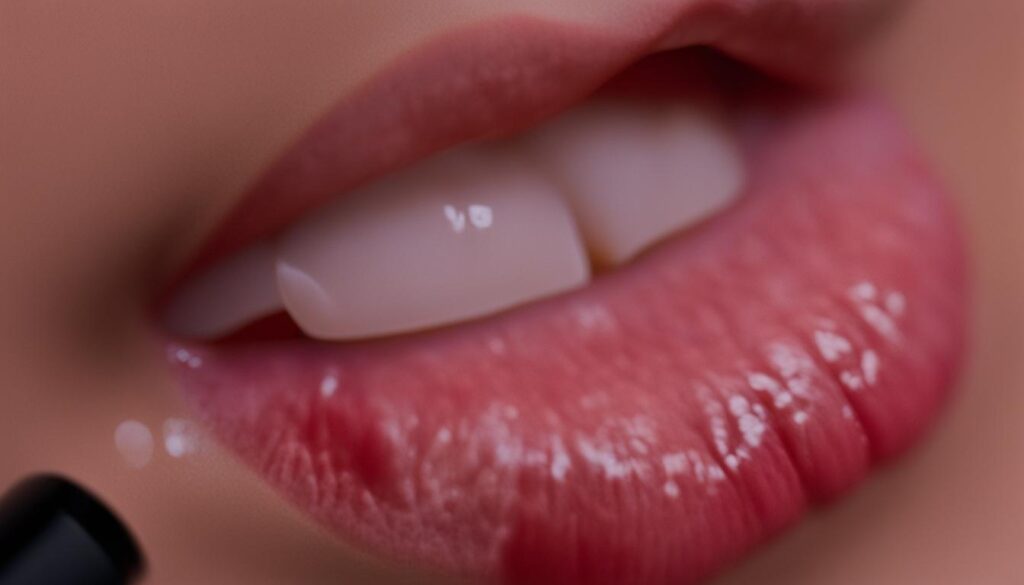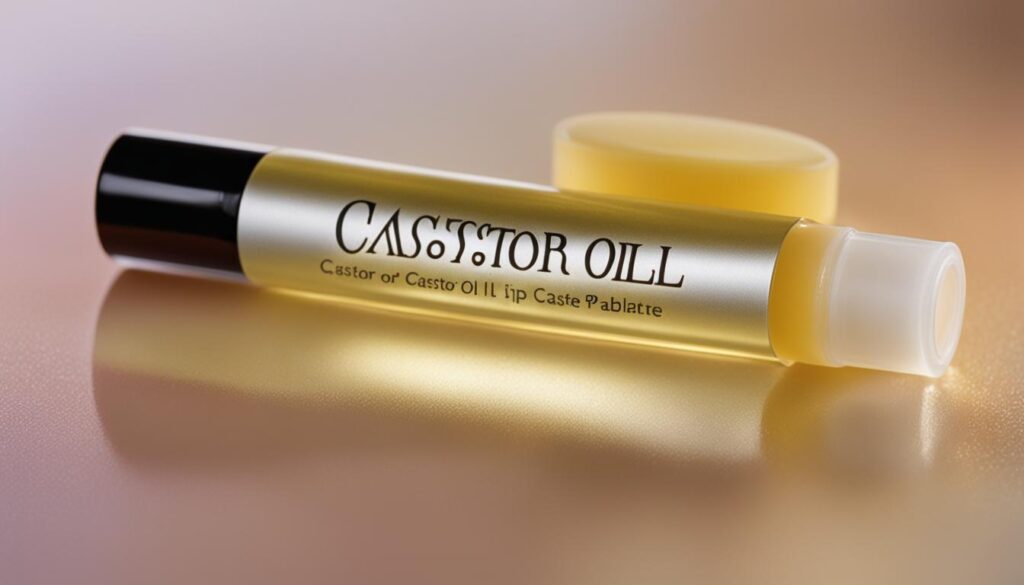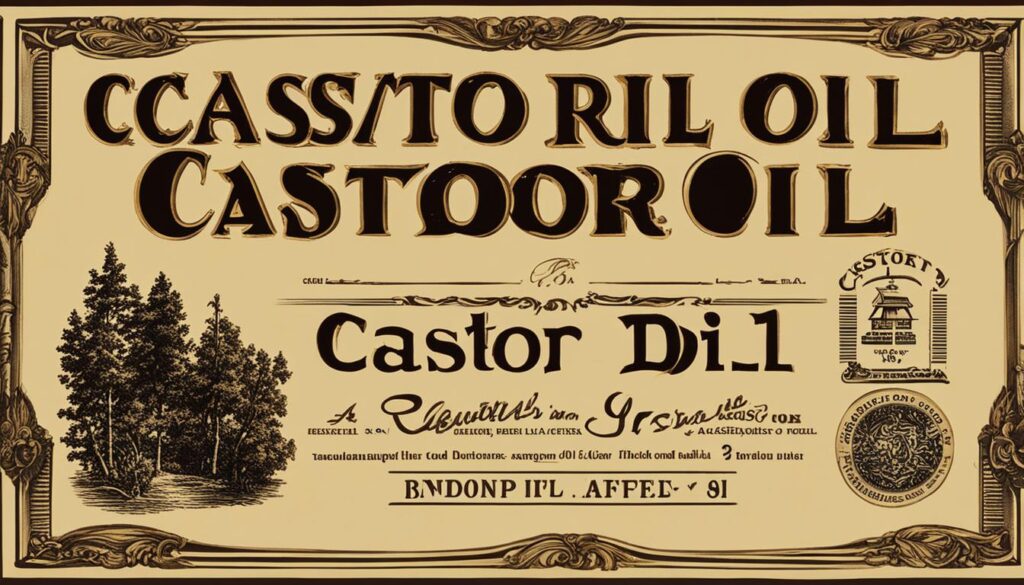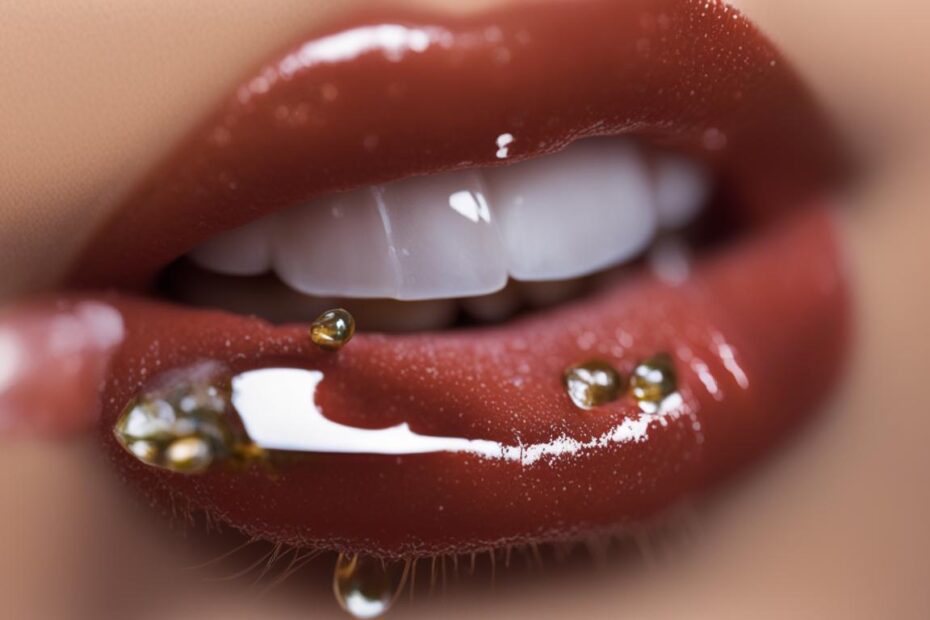When it comes to lip care, we’re always on the lookout for the best ingredients that can bring hydration and healing properties. One ingredient that has gained popularity in recent years is castor oil. Known for its numerous benefits, castor oil is often found in lip balms and lipsticks due to its moisturizing properties and ability to rejuvenate the lips.
Derived from the seeds of the Ricinus communis plant, castor oil contains ricinoleic acid, a humectant that helps retain moisture in the skin. This makes it a potent ingredient for hydrating dry and chapped lips. Additionally, castor oil has healing properties that can soothe and promote the recovery of damaged lips.
Incorporating castor oil into your lip care routine can provide numerous benefits. Not only does it hydrate and heal the lips, but it also creates a protective barrier that helps prevent moisture loss, keeping your lips soft and supple.
Key Takeaways:
- Castor oil is a popular ingredient in lip balms and lipsticks due to its hydrating and healing properties.
- It contains ricinoleic acid, which helps retain moisture in the skin.
- Including castor oil in your lip care routine can result in softer and more supple lips.
- Castor oil creates a protective barrier that prevents moisture loss.
- Before using castor oil on your lips, it’s recommended to do a patch test to check for any allergic reactions.
What is Castor Oil?
Castor oil, also known as Ricinus communis (castor) seed oil, is derived from the seeds of the Ricinus communis plant through a cold pressing process. It is a widely used ingredient in skincare products due to its moisturizing properties and abundance of ricinoleic acid. Ricinoleic acid, a monounsaturated fatty acid, acts as a humectant, helping to attract and retain moisture in the skin.
Castor oil’s versatility in skincare has made it a popular choice for lip care as well. Its hydrating and nourishing qualities make it an effective ingredient in lip balms and lipsticks, providing soothing relief to dry and chapped lips. In addition, the presence of ricinoleic acid aids in the healing of damaged skin, further promoting healthy and supple lips.
When applied topically, castor oil forms a protective barrier on the lips, preventing moisture loss and keeping them moisturized for longer periods. Its emollient properties help soften and smooth the skin’s surface, leaving lips feeling silky and rejuvenated.
Furthermore, castor oil’s potential anti-inflammatory and antibacterial effects make it beneficial for minimizing redness, irritation, and potential infection on the lips. These qualities contribute to the overall improvement of lip health and appearance.
Castor oil’s role in the realm of skincare extends far beyond lip care. Its therapeutic properties make it a versatile ingredient suitable for a variety of skincare concerns, including dry skin, acne, and hair care.
Benefits of Castor Oil in Skincare
“The moisturizing and healing properties of castor oil make it an excellent addition to any skincare routine. Its high ricinoleic acid content helps retain moisture in the skin, promoting hydration and preventing dryness. The emollient nature of castor oil also aids in smoothing the skin’s surface, leaving it soft and supple.”
Here is a complete table showcasing the benefits of castor oil in skincare:
| Benefit | Description |
|---|---|
| Hydration | Retains moisture in the skin, preventing dryness |
| Healing | Aids in the healing of damaged skin |
| Emollient | Softens and smooths the skin’s surface |
| Anti-inflammatory | Reduces redness and inflammation |
| Antibacterial | Helps prevent potential infections |
Risks of Using Castor Oil on Lips
According to studies, castor oil is generally considered safe for use on the skin and lips, with a low risk of causing allergic reactions. However, it is important to note that some individuals may have rare allergic reactions to castor oil. To ensure that you do not have any adverse reactions, it is recommended to do a patch test on a small area of skin before applying it to your lips.
When it comes to ingestion of castor oil, there are different risks to consider. While small amounts of castor oil are commonly used as a laxative, consuming large quantities can lead to diarrhea and other gastrointestinal issues. It is crucial to follow the recommended dosage guidelines and consult with a healthcare professional before using castor oil orally.
It is also worth mentioning that castor oil does not contain the poison ricin that is found in castor beans. Ricin is extremely toxic and can be fatal if ingested. However, the extraction process for castor oil removes ricin, making it safe for topical use.
Key Points:
- Castor oil is generally safe for use on the skin and lips.
- Some individuals may have rare allergic reactions to castor oil, so it is advised to do a patch test beforehand.
- Ingesting large amounts of castor oil can cause diarrhea and other gastrointestinal issues.
- Castor oil does not contain ricin, the toxic compound found in castor beans.

“While castor oil is generally safe for use on the lips, it is essential to do a patch test to verify if you have any adverse reactions. Ingesting large amounts of castor oil can lead to gastrointestinal problems, so it is crucial to consult with a healthcare professional and follow recommended dosage guidelines.” – Dermatologist Dr. Maria Rodriguez
How to Make Castor Oil Lip Balm
Making your own castor oil lip balm is a cost-effective and customizable option. With just a few simple ingredients, you can create a nourishing lip balm that harnesses the benefits of castor oil.
Here is a basic recipe to get you started:
- Melt 1 tablespoon of castor oil, 1 tablespoon of coconut oil, 1 tablespoon of cocoa butter, 1 teaspoon of grated beeswax, and a few drops of vitamin E oil together in a double boiler. Stir until all the ingredients have melted and combined.
- Remove the mixture from heat and let it cool slightly.
- Once the mixture has cooled but not solidified, pour it into small tins or lip balm tubes.
- Allow the lip balm to solidify completely before using.
Feel free to experiment with the recipe by adding essential oils for fragrance or other natural ingredients for added benefits. You can create a personalized lip balm that suits your preferences and addresses your specific lip care needs.
Remember to store your homemade lip balm in a cool, dry place to ensure its longevity.
Benefits of Homemade Lip Balm with Castor Oil
Making your own lip balm allows you to control the ingredients and ensures that you’re using a product free from harmful chemicals and additives. Here are some benefits of using a homemade lip balm with castor oil:
“Homemade lip balm gives you the freedom to customize the product to suit your preferences and needs. By including castor oil, you can enjoy its hydrating and healing properties while nourishing your lips with natural ingredients.”
The combination of castor oil, coconut oil, cocoa butter, grated beeswax, and vitamin E oil creates a deeply moisturizing and protective lip balm. Castor oil’s rich content of ricinoleic acid helps to retain moisture, making it ideal for preventing dryness and promoting smoothness.
Comparison of Store-Bought Lip Balm and Homemade Castor Oil Lip Balm
| Factors | Store-Bought Lip Balm | Homemade Castor Oil Lip Balm |
|---|---|---|
| Ingredients | May contain artificial additives, preservatives, and fragrances | Customizable. Free from harmful chemicals and additives |
| Moisturization | Varies depending on the brand. May not provide long-lasting hydration | Deeply moisturizing. Castor oil helps retain moisture for smooth and hydrated lips |
| Cost | Can be more expensive, especially for high-end brands | Cost-effective. Requires minimal investment for ingredients |
| Sustainability | May come in excessive packaging and generate waste | Eco-friendly option. Can be stored in reusable containers to reduce environmental impact |

By making your own lip balm, you not only have a product tailored to your preferences but also contribute to a more sustainable and eco-friendly beauty routine.
Other Uses for Castor Oil
While castor oil is well-known for its benefits in lip care, its uses extend beyond just maintaining healthy lips. This versatile oil offers a range of advantages due to its various properties, making it a valuable addition to your skincare routine.
1. Natural Laxative
Castor oil has long been used as a natural laxative to relieve constipation. When taken orally, it acts as a gentle stimulant for the bowel, promoting movement and easing discomfort. However, it’s important to note that castor oil should only be used for short-term relief and under the guidance of a healthcare professional.
2. Anti-inflammatory
The anti-inflammatory properties of castor oil make it a popular choice for reducing pain and inflammation in the body. When applied topically, it can help soothe sore muscles, joint pain, and skin conditions such as sunburn and acne. The ricinoleic acid in castor oil contributes to its anti-inflammatory effects.
3. Antibacterial and Antifungal
Studies have shown that castor oil possesses antibacterial and antifungal properties, making it beneficial for overall skin health. It can help fight common skin infections and inhibit the growth of bacteria and fungi that can cause various skin issues. Regular use of castor oil on the skin can help maintain its health and prevent infections.
With its diverse range of uses, castor oil proves to be more than just a lip care ingredient. From its effectiveness as a natural laxative to its anti-inflammatory, antibacterial, and antifungal properties, this oil can offer numerous benefits for your overall well-being and skincare regimen.
| Benefits of Castor Oil | Uses |
|---|---|
| Laxative | Relief from constipation |
| Anti-inflammatory | Reducing pain and inflammation |
| Antibacterial and Antifungal | Fighting skin infections |

Conclusion
Castor oil is a versatile ingredient that offers numerous benefits for lip care. Its hydrating and healing properties make it an excellent choice for keeping your lips moisturized and healthy.
By retaining moisture in the skin, castor oil helps prevent dryness and chapping, leaving your lips soft and smooth. Whether used directly or in homemade lip balms, castor oil can nourish and protect your lips from harsh environmental conditions.
If you’re considering incorporating castor oil into your lip care routine, it’s always a good idea to consult with a dermatologist to ensure it suits your specific needs. They can provide personalized recommendations and guide you on the best ways to use castor oil for optimal results.
With its various benefits and moisturizing properties, castor oil is a natural and effective solution to maintain healthy, luscious lips. Include it in your lip care routine to experience the nourishing effects it provides.
FAQ
Is castor oil good for lips?
Yes, castor oil is good for lips due to its hydrating and healing properties. It contains ricinoleic acid, a humectant that helps retain moisture in the skin.
What is castor oil?
Castor oil is extracted from the seeds of the Ricinus communis plant through a cold pressing process. It is rich in ricinoleic acid, a monounsaturated fatty acid that acts as a humectant. In the context of cosmetics, castor oil is referred to as Ricinus communis (castor) seed oil. Its moisturizing properties make it a popular ingredient in skin care products, including lip balms and lipsticks.
What are the risks of using castor oil on lips?
Castor oil is generally considered safe for use on the skin and lips, with a low risk of causing allergic reactions. However, some individuals may have rare allergic reactions to castor oil. It is recommended to do a patch test on a small area of skin before applying it to the lips. Ingesting castor oil can have different risks, including diarrhea and the induction of labor. It is important to note that castor oil does not contain the poison ricin found in castor beans.
How can I make castor oil lip balm?
You can make your own castor oil lip balm by combining castor oil with coconut oil, cocoa butter, grated beeswax, and vitamin E oil. Melt the ingredients together and pour the mixture into a small tin or lip balm tube. This allows you to control the ingredients and create a personalized lip balm with the benefits of castor oil.
What are the other uses for castor oil?
Castor oil has a range of uses beyond lip care. It can be used as a natural laxative when taken orally and has anti-inflammatory properties that can reduce pain and inflammation when applied topically. Studies have also shown that castor oil exhibits antibacterial and antifungal activity, making it beneficial for overall skin health.
Are there any additional benefits of castor oil for lips?
Yes, castor oil helps retain moisture in the skin, making it hydrating and healing. Whether applied directly or used in homemade lip balms, castor oil can be a valuable addition to your lip care routine. However, it is always recommended to consult with a dermatologist before starting any new skincare regimen.
